Related Research Articles
An oratorio is a large musical composition for orchestra, choir, and soloists. Like most operas, an oratorio includes the use of a choir, soloists, an instrumental ensemble, various distinguishable characters, and arias. However, opera is musical theatre, while oratorio is strictly a concert piece – though oratorios are sometimes staged as operas, and operas are sometimes presented in concert form. In an oratorio, the choir often plays a central role, and there is generally little or no interaction between the characters, and no props or elaborate costumes. A particularly important difference is in the typical subject matter of the text. Opera tends to deal with history and mythology, including age-old devices of romance, deception, and murder, whereas the plot of an oratorio often deals with sacred topics, making it appropriate for performance in the church. Catholic composers looked to the lives of saints and histories from the Bible while Protestant composers only to Biblical topics. Oratorios became extremely popular in early 17th-century Italy partly because of the success of opera and the Catholic Church's prohibition of spectacles during Lent. Oratorios became the main choice of music during that period for opera audiences.

Limburg Cathedral (German: Limburger Dom, also known as Georgsdom after its dedication to Saint George, is located above the old town of Limburg in Hesse, Germany. It is the cathedral of the Catholic Diocese of Limburg. Its high location on a rock above the river Lahn provides its visibility from far away. It is the result of an Early Gothic modernization of an originally Early Romanesque building and therefore shows a Romanesque-Gothic transitional style.

Lothar Zenetti was a German Catholic theologian, priest, and author of books and poetry. In Frankfurt, he was both a minister for young people and a parish priest. He was also active on radio and television. His songs, for example the popular "Das Weizenkorn muss sterben" and "Segne dieses Kind", appear in both Protestant and Catholic hymnals.
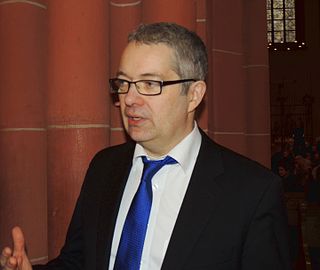
Peter Reulein is a German composer, organ improviser, academic teacher and church musician, from 2000 at the church Liebfrauen in Frankfurt am Main. In 2016 he composed for the Catholic Diocese of Limburg the Franciscan oratorio Laudato si'.

Helmut Alfons Schlegel is a German Franciscan, Catholic priest, meditation instructor, author, librettist and songwriter. He is known for writing new spiritual songs, set to music by various composers.

Neues Geistliches Lied, abbreviated NGL, is a music genre of songs in German intended for church usage, and based on contemporary lyrics and with music by contemporary composers.

Eugen Eckert is a German social worker, minister, singer-songwriter and academic teacher. He is known for his lyrics for new spiritual songs, and his oratorios and musical plays.
Winfried Heurich is a German organist and composer. He was director of church music at Liebfrauen, Frankfurt from 1966 to 2000 and composed music for more than 400 songs.
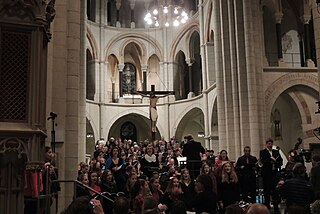
Laudato si' is an oratorio composed in 2016 by Peter Reulein on a libretto by Helmut Schlegel. Subtitled Ein franziskanisches Magnificat, it includes the full Latin text of the Magnificat, expanded by writings of Clare of Assisi, Francis of Assisi and Pope Francis. The composer set it for five soloists, children's choir, Choralschola, mixed choir, symphony orchestra and organ. It was published in 2016 by the Dehm Verlag, and was premiered on 6 November 2016 at the Limburg Cathedral, conducted by the composer.
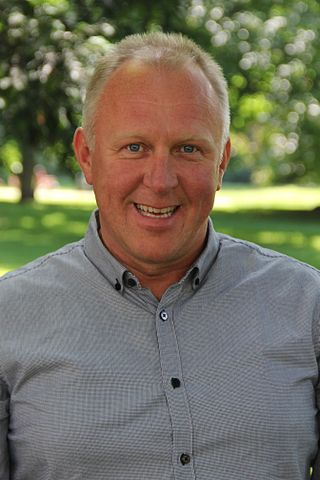
Patrick Dehm is a German Catholic theologian, supervisor and clinical Gestalt therapist. He and his brother founded the Eugen Dehm foundation, supporting a holistic health concept, in memory of their father.
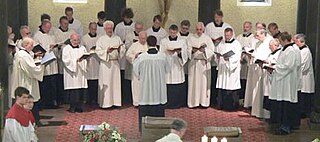
A Choralschola, known simply as schola, is a choir for singing Gregorian chant or plainsong. It consists traditionally of only men, but more recent groups sometimes also include female voices. A schola often performs in uniform. The group may perform in the liturgy of church services, but some specialized ensembles also perform concerts and recordings, such as the Choralschola der Wiener Hofburgkapelle and the Schola Gregoriana Pragensis.
inTAKT is a German ecumenical association (Verein) for the promotion of new Christian songs for church services, and of art, culture and musical education. Its members are mostly hymnwriters and composers interested in NGL.
TAKT is a group of writers and composers of new songs for use in Christian churches, initiated in 1947. The genre which the members promoted was later called Neues Geistliches Lied. The name is short for TextAutor/innen- und Komponist/innen-Tagung, a name that the group adopted in 1997.

"Glauben können wie du" is a Christian poem by Helmut Schlegel, written in 2009, and made a hymn of the genre Neues Geistliches Lied with a melody by Joachim Raabe the same year. It addresses Mary, the mother of Jesus, to be imitated living the theological virtues of faith, hope and love. The song is included in song books and the Catholic hymnal Gotteslob.

"Gott, der du warst und bist und bleibst" is a Christian hymn with text by Eugen Eckert and a melody by Herbert Heine. It is also known by the title of its refrain, "Wir haben hier keine bleibende Stadt". The song was written in 1993, in the genre Neues Geistliches Lied (NGL). It appears in several regional sections of the German Catholic hymnal Gotteslob, and in other songbooks.

"Meine engen Grenzen" is a Christian poem by Eugen Eckert, written in 1981, and made a hymn of the genre Neues Geistliches Lied with a melody and setting by Winfried Heurich the same year. The song, bringing one's shortcomings and limitations before God and praying for a broader perspective, is part of the common German Protestant and Catholic hymnals, and of other songbooks.
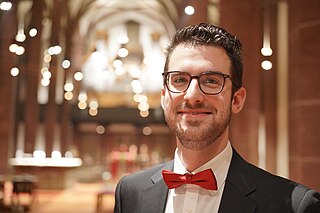
Johannes M. Schröder is a German organist, composer and Catholic church musician. After several years responsible for the church music at the Westerwälder Dom, he moved to St. Bonifatius, Wiesbaden. He is also a lecturer and a music editor.

"Auf zu neuen Horizonten" is a Christian hymn with text by Helmut Schlegel, and music by Stephan Sahm. It is of the genre Neues Geistliches Lied. The song is included in the Catholic hymnal for young people, Ein Segen sein, and other songbooks.
"Auf dem Weg durch diese Nacht" is a Christian hymn created in 2005 by lyricist Eugen Eckert and composer Horst Christill. The song of the genre Neues Geistliches Lied (NGL), was first published and recorded in 2006, and has appeared in German hymnals and songbooks. Auf dem Weg durch diese Nacht became the title of a 2021 choral collection of new compositions for Abendlob.
References
- ↑ "NGL Workshop". St. Michael Amberg. Archived from the original on 22 October 2014. Retrieved 24 January 2017.
- 1 2 Weil der Himmel uns braucht. Dehm Verlag. 2009. ISBN 978-3-7840-3432-4.
- ↑ Reulein, Peter; Schlegel, Helmut (2016). Laudato si' / Ein franziskanisches Magnificat. Limburg an der Lahn: Dehm Verlag. p. 230. ISBN 978-3-943302-34-9. ISMN 979-0-50226-047-7.